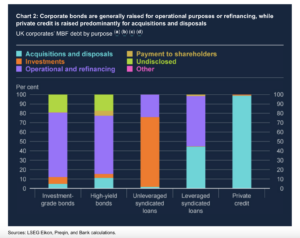Non-public credit score solely tends for use by UK corporates to fund acquisitions and disposals, evaluation by Financial institution of England workers has discovered.
In analysis for Financial institution Overground, a weblog by workers on the central financial institution, the authors analysed 10,000 offers sourced from various kinds of market-based finance (MBF) debt together with bonds, syndicated loans and personal credit score.
The info – a mixture of LSEG Eikon, Preqin, and Financial institution calculations – prompt that syndicated loans and bonds make up over 75 per cent of combination company MBF debt, with the remaining cut up between leveraged loans, non-public credit score and industrial paper.
Learn extra: BoE warns competitors from non-public credit score funds might end in decrease high quality merchandise
Learn extra: BoE sounds the alarm on NAV financing
The analysis checked out UK corporates’ MBF debt by objective and located that 99 per cent of personal credit score was used for acquisitions and disposals, with only one per cent used for investments.
By comparability, round 45 per cent of leveraged syndicated loans are used for acquisitions and disposals, the information confirmed, with many of the the rest used for operational functions.
In the meantime, bonds are typically largely issued for operational functions akin to workers salaries and pensions and refinancing of debt.

The Financial institution’s analysts stated that over the subsequent 5 years, round 50 per cent of UK corporates’ MBF debt inventory is ready to mature, of which round 1 / 4 was issued for operational functions and refinancing, and simply over 10 per cent for investments, and for acquisitions and disposals respectively.
“Sure debt, akin to debt raised for operational and refinancing functions is extra more likely to require common refinancing,” the article stated. “If firms are unable or unwilling to refinance this debt at market costs, they might take defensive actions akin to lowering funding or employment, impacting the actual economic system.”
Because the world monetary disaster, virtually all the £425bn enhance in UK company debt has come from MBF, the Financial institution Overground article stated.
“MBF can diversify funding sources and scale back the probability that funding turns into unavailable to corporates,” it stated. “However it will probably additionally introduce extra vulnerabilities. Crystallisation of dangers in MBF markets might amplify financial shocks and disrupt the availability of finance to UK corporates.”
Learn extra: BoE: Non-public credit score weak to macroeconomic shifts










